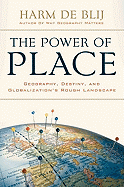

Uphill is a term that takes on new meaning as de Blij addresses the challenges that language, religion, health status and gender present for one local to break through to become a global player. De Blij's analysis of each of these issues is made all the richer by his inspired use of maps.
The maps are nowhere more eye-opening than in illustrating the locales of epidemics and tropical diseases. The chapter on the topography of human health shows the heart-breaking distance that lies between today's global reality and the health-care standard we in the U.S. demand for ourselves. De Blij states, "Conditions in large areas of the periphery [that is, outside the prosperous core with 75% of the income] are in some ways worse than they were a half century ago." With the facts that he presents, anybody can imagine what would have to happen before a person living with multiple diseases in isolated sub-Saharan Africa could benefit from globalization.
The future that vocal globalization proponents envision begins to seem more inflamed than rosy the longer we study de Blij's findings. Efforts to reduce barriers to entry become especially challenging when considerations of religion come into play; de Blij is so daunted by the divisive potential of religious fundamentalism that he sees religion (or at least its recalcitrant offshoots) as a "countervailing force, roughening rather than flattening the landscape of globalization."
De Blij stops short of drawing prescriptive conclusions, but his solid research indicates that if locals are to be drawn into the globalization process (and thus share in the income generated), we all need to prepare on many levels: true diversity with tolerance and acceptance on everyone's part is essential for future non-violent progress of the globalization juggernaut.--John McFarland
Shelf Talker: A brisk counteractant to the empty sloganeering that often accompanies all sides of the globalization debate--provocative, substantive and smart.

